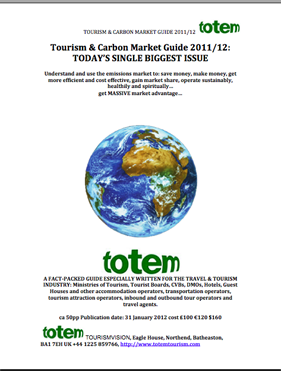Carbon market: tourism opportunity

Weigh the evidence, see the opportunities, confront the challenges, reap the benefits
The carbon market – what opportunities and challenges are there for travel and tourism? How can YOU benefit?
On the one hand: Carbon allowances are at an all-time low price of just €7 a tonne; massive new resources of shale have been found putting a cap on fossil fuel prices; at every turn climate change and the global warming process is being challenged by vested commercial interests; the EU Emission Trading System global expansion is turning into a bitter world trade war; the COP process and the Kyoto agreement to allocate global carbon emissions appear to be slowing to a halt. After 20 years the road from Rio, after all the enthusiasm and determination to have a new world … seems to have hit a dead end.
But, the problem hasn’t gone away. Our world is inexorably stumbling towards 4 degrees extra, which will certainly mean major social, economic, cultural and environmental catastrophes and massive, massive financial costs. It is said that, for each year we avoid action, the build up cost is trillions of dollars. Eventually this bill will have to be paid.
So, eventually, a global carbon market will kick in, for one simple reason – there is no alternative.
Governments will certainly impose legislation to keep within their targets (when they are agreed); they will have to impose fines on entities which do not achieve.
Between governments, between utilities, between industries and down to the level of SMEs, SMMEs and individuals, a carbon market represents a sensible way of managing emissions by giving them a value. If recognized carbon markets do not fulfil this role, then ‘grey’ markets and under-the-counter deals will.
Why will tourism be affected? Because it is the world’s biggest industry; because it currently emits between 5-12% of all global greenhouse emissions and because it is growing dramatically – UNWTO forecasts an increase of tourism of 100% by 2018; a recent forecast indicates a tourism increase of 400% by 2050.
So tourism is going to be dramatically affected by climate change, global warming and, necessarily, the carbon market.
Back in 2007, the World Tourism Organisation (UNWTO) recognized the size of the danger and came up with a plan at Davos – the ‘Davos Agreement’ and in 2009, the World Travel and Tourism Council (WTTC) outlined its vision.
UNWTO called for:
- Mitigating greenhouse gas emissions from the tourism sector
- Adapting tourism businesses and destinations to changing climate conditions.
- Applying new technologies to improve energy efficiency
- Sourcing financial resources to assist poorer nations.
In 2009, the WTTC set out a vision for tackling GHG emission. It included a commitment endorsed by more than 40 of the world’s largest travel and tourism companies to cut carbon emission levels to half of their 2005 amounts by 2035. It also included an interim target for 2020 of achieving a 30% reduction if an international agreement is in place, or a 25% reduction in the absence of such an agreement
The danger of inaction against a warming world include a massive change in both the geographic locations of tourism destinations, enormous changes in the forms of leisure activities available in destinations, even the disappearance of much loved destinations below rising seas. In addition, there will be both increased natural hazards such as hurricanes, cyclones, droughts, loss of biodiversity, increases in disease – concomitant riots, population movements and political strife.
It is hardly likely that tourism will seem a viable activity in such a world stage.
So plenty of reasons to take action which all include financial implications. – and another reason where valuing emissions in a carbon market will provide a critical benefit and incentive.
Even though the global carbon market is currently trading around $150 billion a year, it is set to increase its value to trillions as new emissions trading schemes and exchanges open their doors.
Against this background of change there are major opportunities for tourism enterprises –
- Destinations and the whole range of destination tourism suppliers from hotels to inbound tour operators to tourist attractions can benefit.
- Tour operators and travel agents can benefit
- Transportation operators – airlines, shipping companies, train companies, car hire operators – can benefit
- Small, medium and large tourism investors can benefit
The situation, the forecast and the opportunities are outlined in the new 60page TotemTourism Tourism and Carbon Market Report 2011/2012. Editor Abby Aron, Managing Editor Publisher Valere Tjolle price UK£100
50 half-price review copies are available
To obtain one click HERE
 United Kingdom
United Kingdom United States
United States Asia Pacific
Asia Pacific












































Dozens fall ill in P&O Cruises ship outbreak
Turkish Airlines flight in emergency landing after pilot dies
Boy falls to death on cruise ship
Unexpected wave rocks cruise ship
Woman dies after going overboard in English Channel